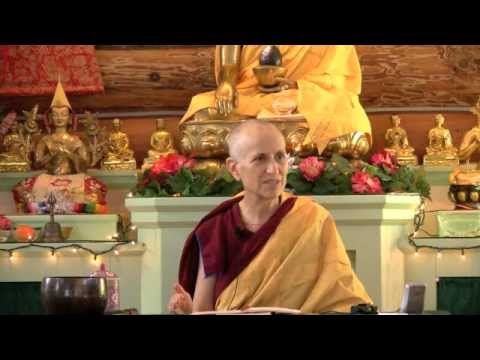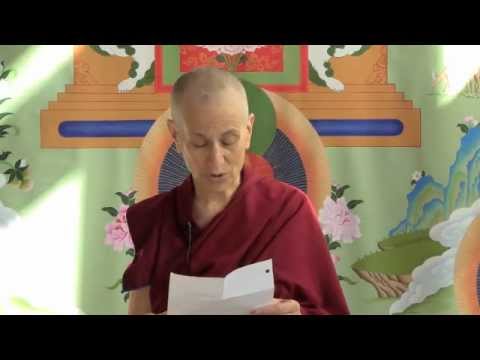The purpose of dedicating merit
This talk was given during the White Tara Winter Retreat at Sravasti Abbey.
- Steering, directing, the merit that we’ve accumulated in the direction we want it to ripen
- Dedicating for the long-term purpose
- Difference between dedication and prayer
White Tara Retreat 38: Purpose of dedication (download)
We’re on the part about dedication. The first of the dedication is the standard verse for dedicating merit, “Due to this merit may we soon attain the enlightened state of White Tara, that we may be able to liberate all sentient beings from their suffering.” That dedication corresponds with our initial motivation because our initial motivation was to become a Buddha for the benefit of all beings, and to lead them to Buddhahood. Now we’re dedicating the merit we accumulated for the same purpose that we had as a motivation for doing the practice.
The purpose of the dedication is to steer the merit that we’ve created. We can see how intention is so powerful in our mind and how we direct ourselves makes such a big influence. Here, after accumulating merit, we want to make sure we direct it to the way that we want it to ripen. Otherwise the merit may ripen in another way. Since it’s positive karma that we’ve created by doing the practice, hopefully [positive], unless you spent the whole session hating somebody and planning how to retaliate. Otherwise you probably created some merit and so we want to dedicate it to the highest purpose: the enlightenment of ourselves and others. By dedicating it to the highest purpose then that merit can also ripen in all sorts of other intermediate, favorable circumstances that will help us get to that highest goal— like having a precious human life, and meeting qualified teachers, and having the opportunity to practice.
If we only dedicate for the lesser goal, you know, “May I have a good rebirth,” or something like that, then the karma will ripen in having a good rebirth. Then hopefully we use that to create more good karma—but the initial karma is finished with that good rebirth. Whereas, if we dedicate it for enlightenment, that karma—it’s results—don’t exhaust until we and everybody attain enlightenment. In the meantime you get the good conditions before that. Is that clear?
That’s really important to do: dedicate for the long-term purpose. It’s also good in our dedications to review some of the short-term purposes too in order remind ourselves of them. That will also help—especially dedicating for the next life—so that we have a precious human life with all the conditions to practice the Dharma, or so that we’re born in a pure land. If we generate that kind of motivation in a dedication a lot while we’re alive, then at the time that we die, there’s a better chance that that will come to our mind at that time. This is important. Every thought that we have at the time of death is important because it’s going to make different karma ripen which will propel our mind into the next rebirth.
Dedication and prayer are two different things. There’s kind of an overlap. If it’s a dedication it’s also a prayer, but if it’s a prayer it’s not necessarily a dedication. I mean, because with both a prayer and a dedication you’re directing your mind and the intention in a particular direction. But with dedication you’ve accumulated some merit and you’re taking that merit and putting it in that direction. Whereas with a prayer, you haven’t necessarily accumulated merit that you’re directing; so a dedication is going to be that much more powerful because you spent your time creating the merit that you’re going to move in that direction.
We’ll stop here. There’s still more to say about dedication, but as the days go on, we’ll get to it.
Venerable Thubten Chodron
Venerable Chodron emphasizes the practical application of Buddha’s teachings in our daily lives and is especially skilled at explaining them in ways easily understood and practiced by Westerners. She is well known for her warm, humorous, and lucid teachings. She was ordained as a Buddhist nun in 1977 by Kyabje Ling Rinpoche in Dharamsala, India, and in 1986 she received bhikshuni (full) ordination in Taiwan. Read her full bio.


